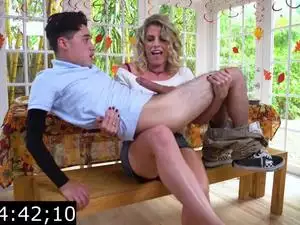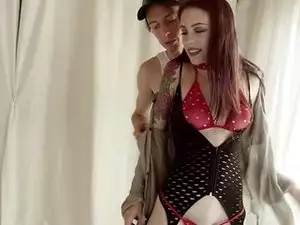Deus ex Machina
- 2 years ago
- 21
- 0

 2 years ago
2 years ago
Introduction: Pregnant with the Demons child… A/N Hi guys, hope you are all enjoying this series. As promised, I present part five! And isnt she a beaut?! My longest chapter so far, I hope it wont disappoint. As always, PLEASE rate and leave comment, I cant convey how much I love them. Also, if you have a spare minute, have a read of my poem called We Stand Together. Its my first ever poem, Im really very proud of it and I would love to know what you guys think, the link is on my profile. Happy...
 3 years ago
3 years ago
Cheers, Steelkat Part 5 Memories of the past day filter through my dazed mind like evidence at a court hearing. All day I’ve experienced irrational emotions; jealousy, betrayal, sorrow and anger, all leading to uncontrollable tears and how could I forget the bouts of nausea? I should have known, the evidence was there, but how could I have guessed? I’m sure women don’t usually feel the effects of pregnancy the day after conception... Right? I step away from my lover, then run a...
 2 years ago
2 years ago
Introduction: Will she choose to stay with the demon? A/N My dear readers! Thank you to everyone who has emailed me with your praise, encouragement and ideas! I love you all dearly and you keep me writing whenever I feel like throwing my laptop away. It is because of you that I present in all its ten thousand word glory, PART SEVEN!! As always PLEASE rate, comment and email me! I love hearing from you guys and I will reply to every email. Happy New Year! Cheers, Steelkat Part 7 My bed is...
 4 years ago
4 years ago
Cheers, Steelkat My father's dream envelops me like a tomb, it's darkness oppressing and tightening around my shoulders. This is what he feels, I realise, as I watch him pace. His footsteps pound in my ears; they are deafening in the darkness. I hear his desperation as he calls out my name and feel his frustration when I do not answer. Choking on his pain, my throat closes against my tears. I want so desperately to run into his arms and assure him of my safety, but Asmodeus holds...
 3 years ago
3 years ago
Introduction: Can she escape from hell? A/N Hello everyone! I hope you guys are enjoying this series as much as I enjoy writing. Please, please send me some feedback if you liked it (or even if you didnt) and let me know if you guys have any suggestions for what should happen next, all ideas are open to consideration. Happy reading! Cheers, Steelkat Part 4 Get up! No use moping, crying will get you nowhere. I push myself off of the wet rock, slipping and scraping my arm as I struggle to...
 4 years ago
4 years ago
Cheers, Steelkat Part 4 Get up! No use moping; crying will get you nowhere. I push myself off of the wet rock, slipping and scraping my arm as I struggle to control my shaking body. Focusing on the icy pain, I encase my heart with that same cold, feeling it harden and add steel to my reserve. It seems silly, but blaming Asmodeus for this latest injury makes it easier for me to envision hating him. He did this to me. While I haven’t quite managed hate just yet, I feel some...
 3 years ago
3 years ago
Introduction: The demoness and the Queen meet again… A/N Hello readers! Im so sorry for the delay, it is truly humbling that so many of you enjoy my writing. Thank you all for sticking with me and for your continued support, you all keep me writing. The storyline will pick up from the next chapter onwards with the introduction of a few new characters. In the meantime, after youve read this chapter, post a comment below and check out my poetry. Asmodeus and Selena (sort of) cameo in one of them...
 3 years ago
3 years ago
Introduction: 20 year old virgin gets abducted by the demon of lust and becomes his bride… Tied down. My arms stretched above my head, aching in their relentless restraint. Panic as I take in my surroundings. Im in what looks like a large cave, the walls made of black volcanic rock. Rivulets of lava seep down through numerous cracks in the surrounding walls, cooling and hardening, adding to the texture of the cave. The heat makes me sweat uncontrollably, beads of it roll down my face. My...
 5 years ago
5 years ago
The heat makes me sweat uncontrollably, beads of it roll down my face. My tongue is a desert, every swallow painful. The air is acrid, stinking of sulphur and smoke. Every breath is torture in my lungs, making them burn with an evil intensity. The platform I'm lying on seems to be made of the same rock as the walls, hard and lumpy, digging into my back. Rusted iron shackles encircle my wrists and ankles, pinned into the volcanic rock with nails as thick as my forearm. I yank at them,...
 2 years ago
2 years ago
Introduction: Her first time with the demon of lust… A/N – Hi guys, I hope you like this story. For those of you who left comments, I sincerely thank you. You have no idea how much it means to me, seriously! In fact I loved the comments so much that I this is the fastest I have ever written anything, ever! I want to please you fans of the story THAT much! So please, please, PLEASE log on and write a comment below, good or bad (as long as its constructive) I really do love reading them! ...
 3 years ago
3 years ago
Introduction: The morning after… A/N – Hi guys, sorry for the wait, hope this doesnt disappoint! Please let me know what you guys think, I still love reading comments so much! Cheers, Steelkat29 Part 3 When I wake, I am confused. This doesnt feel like my bed. My body is sore and when I shift my legs slightly a spasm of pain rushes through me from my womb. My skin is chilled and feels odd, but I cant yet place my discomfort. It doesnt take me long to figure it out though. Why the fuck am I...
 2 years ago
2 years ago
Cheers, Steelkat29 Part 3 When I wake, I am confused. This doesn’t feel like my bed. My body is sore and when I shift my legs slightly a spasm of pain rushes through me from my womb. My skin is chilled and feels odd, but I can’t yet place my discomfort. It doesn’t take me long to figure it out though. Why the fuck am I naked? My vision is blurred and my eyes feel itchy and painfully dry. Did I forget to remove my contacts last night? I make a move to rub my eyes. As soon as I lift my...
 3 years ago
3 years ago
Cheers, Steelkat29 Part 2 Lying on the demon's soft bed, his body weighing over me, I feel my pleasure mounting again. One hot finger massages my throbbing clit while two more stroke the moist folds of my opening. My own hands are grasping at his dark broad shoulders, holding on to him as if he were my lifeline in this ocean of ecstasy. I'm drowning in it, sinking further into the abyss. My world is melting, becoming one with his, and becoming one with him. Every touch, every...
 4 years ago
4 years ago
Cheers, Steelkat Part 6 The next morning I wake up in Asmodeus’ arms again and nestle myself closer to his wonderfully warm chest. I tilt my face up and watch him sleep, letting my breathing mingle with his. He looks so lovely; his face peaceful and exquisite as an obsidian angel’s. I lean in and press my lips against his. When I draw back, twin rubies reveal themselves; framed by silver lashes. They are filled with only warmth and love for me while pearlescent white teeth flash...
 3 years ago
3 years ago
Vendeuse MarieaAnne Smith Chapter 1 Suzie & Mary "Mary, it seems such a long time since we've talked. I've just been shopping, including a visit to your boutique. I had hoped to see you to chat, though I did need a new bra, so it would have been nice for both of us. Your new vendeuse, though, is a super saleswoman. Almost before I had realized it I had a new bra and panties to match, she even persuaded me to buy two pairs. I haven't been fitted...
 3 years ago
3 years ago
Vendeuse Chapter II John & Jenny I had, as usual on a Monday, opened So Feminine at 10.00, though really hadn't expected many customers in the morning. It gave me a chance however to put the stock back in order. Saturday had been a rush and I had been alone in the afternoon with many customers to serve, so there were things to tidy up, a couple of new season range catalogues to glance at and some bills to pay. Some clients, especially the younger ones are so untidy and some...
 2 years ago
2 years ago
As I stepped into the outer office I became aware of two distinct things: one was the radiant smile spreading over Megan's face at my appearance and the other was that annoying grin still plastered on Miss. Adamson's face. I thought it best to take care of the annoying one first. Besides the personal satisfaction this would bring, it would also set the tone for my interaction with the rest of the faculty. Turning toward her, I said, "Miss. Adamson, would you be kind enough to notify...
 2 years ago
2 years ago
all characters are over the age of eighteen years ***SMYTHE – Ironshire, Ekistair*** The morning of the day after Aran departed Ironshire, Smythe was on his way to visit an old friend. After all the intense training he’d put Aran through in the past three months, Smythe was in the mood for a relaxed, quiet chat, and he knew just the man to see. “Henley!” Berrigan exclaimed with a laugh when he opened the door. “Hello, Berrigan,” Smythe said with a grin, clasping forearms with the...
 3 years ago
3 years ago
‘Alright, the power is shut off for this section of the ship, as approved by the Captain. It’s late enough there aren’t many people active now, so if we work fast, hopefully we won’t be observed.’ ‘You realize the extent of the risk we’re facing here,’ Kaci reminded him. ‘All the more reason to shut up and work, so we’re less likely to be discovered.’ “Just get those cables stowed and I’ll connect the necessary communication links,” Zita said aloud. “Okay, those are the last of the...
 4 years ago
4 years ago
He walks over to a table against the wall, picks up several items and returns. He lifts your head and brings a cup of very cool water to your lips. You had not realized just how thirsty you were, you drink greedily. The water tastes so good. When you have emptied the cup he sits it aside. He then produces a large bowl of fruit. Drawing out an apple, a large, red delicious apple. He takes a small paring knife and begins to cut the apple into slices, he then peels each slice. He begins to cut...
 2 years ago
2 years ago
I turned and slowly struck a pose in profile while Dede panned around my long hard on. "Have any of you seen Hammer Man?""Nope!" answered Cessa."Oh well," I sighed. "Do you suppose while we wait one of you could, (dramatic pause) Fuck me up my ass?"********************************************************************It was hard to believe that this was the same place I was in several weeks ago. Gone was all the casual joking, and the laid back atmosphere. It was replaced with all kinds of...
 4 years ago
4 years ago
"Then come get me..." I say and pull against the cuffs again. "Mm, mm, mm. Not yet, Ms. Adams. We're going to do this right," he says and tosses my vibrator onto the bed. He removes his coat and walks over to his dresser, pulling out a maroon tie. "Lift your head," he murmurs as he walks over to me. I do as he says and he wraps it around my head, covering my eyes. "Can you see anything? Be honest... it'll ruin the fun if you lie." "Nope, nothing." "Good," he says, and then I hear nothing. Not...
Novels 4 years ago
4 years ago
Kevin followed her to the gate. As she put the key in the padlock, he noticed a metal sign above the entrance. It said "Ai-lara" on it. "I see you've named your estate," said Kevin, trying to relieve the tension. Amanda nodded, as she put the proper key in the lock and gave it a twist. "I named it for... an old friend." Kevin followed Amanda mutely through the gate. The remnants of the old gravel drive were rapidly disappearing under a growth of weeds. In a few years, you'd be hard...
 3 years ago
3 years ago
I must dedicate this to one of my loyal readers, Tiffany Jean. Synopsis is that Esther meets her lover Tamara's former flame, Tiffany Jean. Tamara is shocked by Esther's confession. Esther V By TamarainRubber I had absolutely no clue what Esther had in mind. She had been gone for ten minutes, leaving me to deal with her overly-sexed friend who was moaning like a cat in heat. When she finally returned, I almost fainted. Esther walked into the room with a slim girl who...
 2 years ago
2 years ago
Gianna Dior and her stepbrother Tony are on a trip, but there’s an emergency at the hotel. There’s a hostage situation that prompts Gianna to call her mom in a panic. When Gianna is distracted, Tony pulls his dick out and strokes it to hardness. After his stepsis gets off the phone, Tony takes that opportunity to suggest that Gianna shows him her tits so he can see them before they maybe die. Once he lays eyes on Gianna’s jugs, Tony begs to touch them. Now that they’ve...
xmoviesforyou 2 years ago
2 years ago
I'm going to publish this under “stories” and while most of this completely true, I've had to change or embellish on exact verbiage as best I can remember it. This is going to be a slow burn, so if you are looking for a quick sex story, you might want to move on. Just a fair warning.I was engaged to my wife Jill when I was fairly young. I was twenty-three and she was twenty-two. She is a beautiful woman with dark hair and stunning blue eyes. It was definitely lust or infatuation at first sight....
Wife Lovers 4 years ago
4 years ago
So Marie and I went to get dressed. Since I had ridden to the party with Karen so Marie offered to takes us to my place. I put my arms around her shoulders and kisses her soft lips lightly. I open her door for her then get in beside her. She giggles, "May I say something." "You can say anything to me at any time." "Daddy, no one has ever opened my door for me! That was so hot and so expected of a gentleman." She grabs me and kisses me hard. She breaks the kiss, "I knew I chose the right man to...
 1 year ago
1 year ago
Sexy Youtubers, aka Social Media Girls! Do you want to see social media influencers naked at SexyYoutubers? With the rise of social media and the popularity of sites like Youtube that allow people to become “internet famous,” there has also been an increase in the number of sexy chicks who are in the public eye. There are now tons of hot Youtube personalities, Instagram models, Twitch streamers, private Snapchat accounts, Patron girls, and sites like Only Fans that let you subscribe to girls’...
The Fappening 4 years ago
4 years ago
Hans’ Narrative “Get your arse in the air,” ordered the Boss crisply. I’d got word a little earlier that the Boss wanted me down in his quarters. That pleased me for it more or less certainly meant that I was going to have to fuck the arse off that new bint he had recently acquired. Her name’s Simone and she was a right hoity-toity bitch when she arrived. It’s great to be able to help to cut her down to size. When I was let into what the Boss likes to call his Playroom, I saw that he was...
 4 years ago
4 years ago
Shared my wife with my buddyTrue Story Happen in the seventies. I had been married to my wife for 6 months and sex life was great. Been hanging with a high school buddy Ed Saturday afternoon we had been drinking beer all afternoon. As the early evening came. My wife asked if Ed he wanted to play cards. Ed said "sure" started off playing spades. After an hour Ed suggested playing poker. Drinking beer and an hour later. My wife asked Ed "truth or dare?" Wife asked Ed had he been in a 3 some? Ed...
 2 years ago
2 years ago
Karen nearly panicked when the young man climbed out of his car and leaned back in to retrieve his gear. If her guess was right, he probably wasn’t even old enough to drink yet. Oh no, no, no! Why didn’t I ask to talk to who they were sending first! She glanced back over her shoulder at the gymnasium that would soon be filled with children – including her own son. What had promised to be a triumph that would unseat Betty, the PTA queen of organization, now teetered in the balance, all hinging...
MILF 3 years ago
3 years ago
I will write it short and concise. But, if you guys will want me to expand it into a complete storyline, I will do it thenceforth. DAY 1 It was a normal north Indian evening in the month of June. After a day, of scorching sun and burning loo, people from around the neighbour get to come out and socialize in the park, made alongside an ancient pond with its mystic stories. Therein under the shade of numerous Mango, Tahli, Jamun, Deor trees, was made a spiral footpath. Alongside it...
 3 years ago
3 years ago
Well, one person did. But let’s face it, there was no way she could help me. She was doing exactly the same thing only she was completely out of control and too wrapped up in her own problems to realise that I was in trouble and needed help too. She was the only one that understood it but I couldn’t even unload my issues on her. She didn’t need my problems as well as her own. Hearing your friend tell you that she cuts herself rather than talk about her feelings is indescribable. I...
 4 years ago
4 years ago
Unbelievable There I was, your cock and his in each of my hands. Resting on my knees between each of you facing me, I wondered what you could see in the look on my face. Concentration was there. Of course it would be. I want to do everything well. My eyes were narrowed and I wondered if you would notice that pinched spot between my eyes that others might not notice. You know me too well. You knew it meant I was so focused that I wouldn't let myself be cheated of anything this moment might...
Group Sex 2 years ago
2 years ago
okay now that I have stopped laughing at your delightful honesty at the reality that yeah that's right there will be no stoppi Okay now that I have stopped laughing at your delightful honesty at the reality that yeah that's right there will be no stopping me and you will very likely scream, moan and scream even louder for more and I will demand that you beg me in a loud voice to fuck your shit hole harder, bigger, please fuck me I want you in my fuck chute so bad so yeah, best not do it...
 2 years ago
2 years ago
Hi to all ISS readers. I am a very frequent reader of all the stories in ISS and finally, I come up with my first sex story and this is the real life story of mine. Even when I wrote this sex story, my mom and my sister were sucking my dick and balls respectively. Let’s me a take a little time describing my mom and sister. Coming to my mom she’s a 44-year-old milf with stats of 38D-30-38. She has an ass to die for and no extra skin at wrong places. And my sister is a hot sex bomb. She is 21...
Incest 2 years ago
2 years ago
Last year I retired from my job as a firefighter. As most know firefighters have a second job to make ends meet, mine was a licensed massage ther****t for the past 9 years. I continue to do that as it’s an easy job, good money and I can pretty much work when I want. I was asked and subsequently accepted a position as adjunct faculty at the local school to teach part time. Here is where it becomes interesting. My DIL came to me and was asking about the profession. She’s 24, and was still trying...
 2 years ago
2 years ago
Laying OutBy SpectreOfHell It was a warm day, but not as warm as Vicky wanted it to be. Summer was fading and she still hoped to get a little bit of a tan before she couldn't lay out anymore. Her husband had to work that day, and the contractor he'd hired to work on the dock was late, but it was a Saturday and she wasn't going to let it go to waste. She started to put on a par of shorts and a halter top then changed her mind. No, today she'd wear that bikini she'd bought on impulse and had...
 2 years ago
2 years ago
I'm sorry it has not posted when I first submitted this part of the story so I'm trying this again.I Help My Aunt, Who helped Mom (part two)The next morning I woke up to a nice warm wet suction feeling on my dick, and a warm wet nose, and in opening my eyes, I see this bald wet pussy lips lightly grazing my nose, and the lower half of a sexy round butt right above it, in a bent over position, mixed with the smell of a pussy needing some attention, so I stuck my tongue out and gave that pussy a...
 2 years ago
2 years ago
Emma was a prisoner. There were no walls, no bars, nor wire fences keeping her. She could travel far and wide, in fact she had tried, but it provided no escape. Police, friends, and family, none of them could help, not that she had not tried. She had begged and pleaded for help, but all to no avail. Her prison was everywhere, her keeper could be anyone, her fears kept it all locked tightly. These are glimpses into the life of Emma, a perpetual rape victim: THE FIRST TIME: Until today Emma had...
 3 years ago
3 years ago
My wife and I have been married for ten years. We got married right out of high school at the age of nineteen. Our marriage is a happy one, almost flawless, except that she is not very experimental. She hates giving me blow jobs, and usually only wants to do it missionary. I have tried everything to get her to try new stuff, like watching porno's, looking at magazines, and the works. But she says she doesn't get the point of it. One day a friend of hers from high school called up and said she...
 3 years ago
3 years ago
I had ducked out as soon as my last class was over, half afraid that Cathy would try to pick up the conversation where we had left it earlier. After Cathy, I was more determined than ever to talk to Missy. I just had no idea how to make that happen. Lost in thought, I didn't notice a driver blow through a stop sign. He nearly ran me over. I shook my head, and checked both directions before continuing on. I sure as heck didn't need to end up in the hospital again. And just like that, I...
 4 years ago
4 years ago
It happened one morning before work, at the Starbucks a block away from my office. An ordinary day, really: just a coffee, a danish, and a glance at news articles on my phone before work. And then I saw her, standing in line in front of me waiting to get a coffee. She couldn’t have been more than nineteen. She had wavy caramel-brown hair with subtle blonde highlights that went down just above the small of her back. She wore a puffy North Face jacket, a pair of tribal-patterned leggings that...
 3 years ago
3 years ago
One morning while we were dressing, Monica for the office and me to do some shopping for dinner that night, Monica said to me, "Oh, never mind that. We've been invited out." It took a moment for that casual remark to sink in and astonish me. "What?" I said "By who? How?" "Oh, don't look so shocked! It's nothing! I told two of the girls we deal with at the office about you, that you're pretty much house bound these days, and they asked me to bring you over for dinner to help clear...
 4 years ago
4 years ago
I woke up soon after sunrise. Sherry wasn't beside me. I guess she was up already. I got dressed and climbed out of the tent. Joe and Barb were sitting at the campfire circle. "Joe. Barb. Do you have a few minutes?" "Sure, what's up bro?" "Can you talk to Jon and Amy? They had sex yesterday. They didn't think about pregnancy and protection. They are worried." "Well, Barb and I couldn't miss the show last night." "Actually, I think that was the fourth time that you heard last...
 3 years ago
3 years ago
Part One WPC Helen Green was a police woman with the Metropolitan police, she was stationed in central London, at the Ethnal green station. It was a warm summer evening, WPC Green sat with the other coppers in the briefing room, It was the start of another night shift. She was a big girl 5'10" black hair, green eyes, a deliciously pouty wide mouth. Fair complexion. Large 40D tits crammed into her taut white blouse. She looked about at her collegues, Dave Brooks, fat sexist oaf. John Davies,...
 2 years ago
2 years ago
You are a filthy cock addicted slut. You are on your way home from a 10 day vacation with your parents. It is the middle of the night, your dad is driving, your mom is asl**p in your lap in the back seat. You are masturbating anyways. This vacation has been terrible. Right before you left, your mom caught you sending dirty text messages to a guy. She has watched you like a hawk all week. Usually, you like to get fucked once a day at least. Some times you can make it a day or two by...
 2 years ago
2 years ago
Chat Guest: Paul1954 On Sunday June 6, 1999 at 2pm PST Moderated by Wendy-J Edited by Anne-Mal You can e-mail Paul at: [email protected] (*Wendy-J) You are now all on candid mike! (Paul1954) I do know a few pubs, but that one is all imagination. Maybe I need more research! (*Wendy-J) Yep! (Darkside) Wheatsheaf. A classic Brit. name for a pub. (Lorna) Wheatsheaf? Sounds like too much whole grain goodness! (Paul1954) Oh, we've got lots of good names. We spend a...
 2 years ago
2 years ago
STUPID by Suzi (Johnson) Thomas It was my big mouth that had gotten me into trouble, as usual. I had been in a singles bar, and I was hitting on two attractive chicks, bragging about what a good lover I am. We had a few drinks as I kept running my mouth off, and the blonde, Debbie, turned to the redhead, Pat, and said, "I think this guy is full of shit; do you want to give him a chance to put his pecker where his mouth is?" "Why not," Pat responded, "he is pretty good-looking, for an...
 4 years ago
4 years ago
After positive actions with my sexy stepmom, my hot sister, and Nisha, I jerked off my cock and had one of the best orgasms. I had cum in my underwear. So I went to sleep naked, leaving the dirty underwear on the floor. In excitement, I didn’t even realize I had left the door open. The next morning, I was still not fully awake when I heard the sound of the door opening. As always, my stepmom had come with a cup of coffee. I was half asleep and lying down on my back, exposing my semi-hard cock....
Incest 3 years ago
3 years ago
Hi friends, en peyar Meenachi, vayathu 35 aagugirathu. Enaku iru pasangal irukiraargal, avargal schoolku sendru kondu irukiraargal. En kanavanuku 45 vayathu aagugirathu. Ippozhuthu ellam en kanavan ennai sex seivathe ilai naan eppozhuthum iravil en kanavna udan sex seiyalam endru ninaikum pozhuthu avar asanthu poi thungi vidugiraar. Intha vayathil thaan enaku athigamaaga moodu erugirathu, pengal 35 vayathil irunthu 40 vayathu varai thanga mudiyaatha kuthi aripu ear padum. Avargal athai...
 2 years ago
2 years ago
She was sitting having coffee when a man sat down across from her and began to chat. He was about fifty five and she was just eighteen. He was very attractive and they talked a long time. When she got ready to go he asked her if she wanted a ride home. She decided she would. They got in his nice new town car and as they drove he carried on pleasant conversations. Then he told her she was very pretty and quite sexy. He asked if she had a bf and would she ever date older men.She then noticed he...
 3 years ago
3 years ago
I ?This gathering shall now come to order,? the pastor roared into the microphone as stragglers hurried to fill the remaining seats in the gym. The pastor, a stern, bespectacled, gray-haired 45 year old sat behind a table, flanked by four church elders, two on each side.?Let the Lord’s witnesses and record-keeper note the date and time. It is Saturday, September 7th and the time is 1400 hours,? he continued, as the gathering fell silent.He cleared his throat, drank some water, and continued,...
 4 years ago
4 years ago
Courtney gasped as they opened up the door of the van. All along the walls of the van were straps hanging down from the ceiling. In the center was a table about 3 feet high attached to the floor. Straps were placed on all four-corners. She could see whips tossed in the corner. "Please, don't hurt me," she sobbed as the guards pushed her inside. "This is going to be a long ride, so I think we should get acquainted with you," his eyes lusting at this young beauty. "If you want to...
 2 years ago
2 years ago
HIM:I couldn’t have been more vulnerable—naked literally and figuratively. My face was buried in the sheets, my ass in the air, hands parting my cheeks. A woman I barely knew was poised behind me armed with a strap-on cock. Her first thrust was a heartbeat away and my virgin ass was puckered in a knot. This was not what I signed up for. HER:Two weeks earlier: He was always flirty and had a wicked glint in his eye but also seemed naïve and straight-laced. The kind of nice guy who liked to...
Anal 2 years ago
2 years ago
So my life now consisted of going to work and being a big cock slave to Ken and his friends whenever they wanted me.This went on for quite some time and i was beggining to get a little bored if im honest, i was going to call Ken and tell him that was enough for me now and that i was going to move on in life.I called him and said what i had been thinking when he got really angry and said, i say when you have had enough young man you got that, and if you dont do as i say i will be posting that...
 4 years ago
4 years ago
The holiday season was a crazy time for everyone in the Circle and for many of the families of Circle members. Somehow, Bobbie and her two sous chefs manage to feed nearly three-hundred people for Thanksgiving. The weather was perfect and the Circle seated people both inside and outside. Everyone eating brought Bobbie, her chefs, and the entire kitchen support teams to tears with our cheering and appreciation for all their hard work and effort to make the holiday meal a perfect occasion for...
 3 years ago
3 years ago
I was still working on the completion of my efforts with Helena. After her night's rest I released her from the temporary cage that was now her nocturnal home. I had decided that there were some specific results I wished to obtain from a small experiment and advised the Prince's housekeeper that Helena would not be available for work that morning. Helen, anticipating an easier time than her normal round of domestic duties, seemed pleased when I informed her she would be remaining in her...